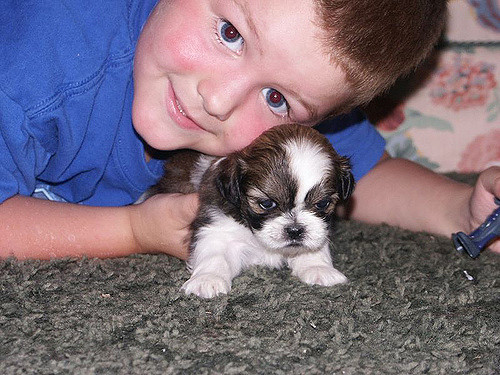Finding the Best Dog for Children
January 22, 2018
For anyone who both has children and loves dogs, there’s likely always a question brewing about the breed that would be perfect for your family. No one answer exists, and any dog can theoretically be great with kids. You can continually speculate about the right dog breed, but, like every human being, individual dogs are different from one another and can vary in how good or bad they are with children. Many factors can affect one dog’s chances of getting along with children, so here are a few things to remember as you set out to pick your family’s dog.
Training
For any pet dog that’s brought to live with a family, obedience training is often essential, even for just learning the rules of the house. Before choosing a dog, make sure at least one family member can spend enough time training the animal, especially if it’s a puppy. If your children want to help with training, ensure an adult is around to provide supervision—nobody wants to whip out the Manuka honey (to treat dog bites) if they don’t have to! Additionally, the children must be taught how they should act around dogs in general.
Size and Age
When deciding on a dog, consider your children’s activity levels and ages—toddlers will get knocked around by gangly, awkward puppies who don’t know their own sizes whereas larger children might crush small dogs if they’re not careful all the time. With this mind, it may be best to get an adult dog that’s used to children rather than a puppy, as they’re a great deal of work and need plenty of attention.
Personality
Families with children ideally need intelligent dogs with moderate energy levels and good temperaments, making some breeds into naturally better fits than others for children. Several dog breeds that often get along well with kids include the following:
- Golden or Labrador Retriever: These dogs are often intelligent and great with children, but they’re also very hyperactive when they don’t receive enough exercise.
- Bichon Frise: These small fluff balls love playing, but they usually aren’t too hyper. Small dogs like these would also do well with your small humans, but remember that a grooming schedule is required.
- Poodle: Poodles are actually very smart and have great temperaments. Plus, they have size options—standard, miniature, or toy—but, like the Bichon Frise, they need regular grooming.
- Beagle: This breed is friendly, smart and not that big, which makes them suitable for children. While some might be a little high-strung, beagles typically respond well to training.
- Shetland Sheepdog or Collie: Both are very gentle, calm, and tolerant dogs that usually do well around kids of all sizes and ages—think modern-day Lassie.
- German Shepherd: These dogs are extremely protective and loyal, but they must be trained. German Shepherds also have playful sides, especially when young.
- Mixed Breeds: Mutts are usually intelligent, well-balanced dogs that do well with kids—and you can become the forever home for a shelter dog in need of a loving family.
Finding Your Family’s Next Dog
When it’s time to pick out a new dog, try checking out animal rescue organizations in your area and asking about dogs that went through foster care. Foster "parents" love the dogs and know them well, and because they hope the dogs will find good homes, they’re often honest about temperaments and personalities. You can also ask for help from rescue workers to guide you to dogs that would fit your family’s lifestyle. If looking for purebreds, try reputable breed-specific rescues.
If you elect to go to a breeder, research potential breeders thoroughly, asking for references and talking with other dog lovers, including your veterinarian, in your area. Once you’ve chosen a breeder, take the time to talk about the pups’ socialization history and temperament. A responsible, experienced breeder will know the puppies and their parents well and will freely share information with you.
Photo - au_tiger01 via Creative Commons License


.jpg)



